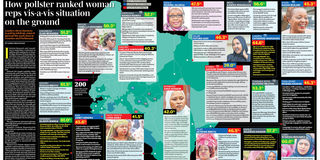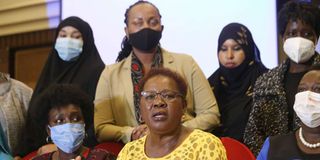Premium
A tale of love and hate: Unravelling the Women Reps

How Infotrak ranked women reps vis-a-vis situation on the ground.
What you need to know:
- The 47 Women Representative position was created through an affirmative action.
- In drafting the harmonised Constitution, the Committee of Experts (CoE) which succeeded Constitution of Kenya Review Commission in 2009, proposed proportional representations of women to the National Assembly.
- CWRs were first elected in 2013 under the new Constitution.
- The proposal in the BBI report to scrap the position has divided women leaders and rights organisations.
- Nominated MP Cecily Mbarire noted that women had struggled to get where they are and it would be wrong to take away the gains so far attained.
- Controversy has raged over the role with critics, overwhelmingly men, calling it useless, simply swelling the country’s wage bill.
In the year 2000 when Constitution of Kenya Review Commission chaired by Prof. Yash Pal Ghai-later headed by Abida Ali-Aroni-began its work, representation of women in Parliament was pitiful.
In 1992, for example, only six women were elected. In 1997, only four and this improved to nine in 2002. Further, the Constitution (1963) was discriminatory. Section 82(3) excluded sex as a ground for discrimination, restraining women from challenging any form of bias based on sex. Under this Constitution, a woman would not pass her citizenship to either her husband or children, should she be married to a foreigner. This was unlike the man.
In 1991, the country adopted multi-party democracy ushering in a new era when women movements, associations and organisations formed without fear of being muzzled by former President the late Daniel Arap Moi’s regime. These new formations including Kenya Women’s Political Caucus formed in 1997 renamed Caucus for Women’s Leadership in 2007, League of Kenya Women Voters - 1992 and National Commission on the Status of Women pushed for engendering of the constitutional review process.
To the Constitution of Kenya Review Commission (2000-2005), the women proposed 30-50 per cent women’s representation in all decision-making positions and employment in both public and private sectors, proposals that finally made it to the draft Constitution albeit not in their entirety.
New Constitution
With the increased representation, women hoped to eliminate system barriers and inequalities through pressing for legislations that ensured they had equal rights, especially in relation to owning land and property as well as entitlement to children within and outside marriage.
“We wanted to get more women to the table so that they could have an impact on the laws,” says Rahab Muiu, chairperson of Maendeleo Ya Wanawake, one of the women movements that lobbied for a new Constitution cognisant of women rights. She says, women aggressively lobbied their MPs to support affirmative action proposals.
In drafting the harmonised Constitution, the Committee of Experts (CoE) which succeeded Constitution of Kenya Review Commission in 2009, proposed proportional representations of women to the National Assembly; they would be nominated depending on the number of women elected.
The affirmative action became a contentious issue when the Parliamentary Select Committee’s (PSC) dropped the proposal without giving an alternative mechanism to ensure not more than two-thirds of the elected members were of the same gender. This prompted the CoE to create the affirmative 47 positions to address gender disparities in the National Assembly.
“To assuage the incongruence, we came up with the 47 County Women Representatives (CWRs) so that if no woman is elected, there could be at least the 47 women elected,” says former CoE member Mr Bobby Mkangi.
Both genders
The position of the CWRs should, however, not be misconstrued for an “only women interest seat”. Their role extends from amplifying women’s voices in the legislative process to deliberating issues concerning both genders, explains Mr Mkangi.
They are also to develop and pass laws that address the needs of either men or women. Centre for Rights Education and Awareness, Access to Justice Officer, Ms Isabella Mwangi, says in the broad scheme of things, the position benefits both men and women.
“In retrospect, the seat was created for the intent of ensuring the voices of women are heard in the male-dominated Parliament,” she says.
“But it is important to look at their roles through the gender lens. For instance, when they support the women self-help groups through their fund, eventually both men and women benefit," she says.
“When a woman gets money, the whole household benefits. The children will go to school and the husband will be taken care of."

Kirinyaga Woman Rep Purity Wangui Ngirici (centre) with other MPs address the media at Parliament buildings on the Covid-19 situation in the country.
CWRs were first elected in 2013 under the new Constitution. By 2014, they had aggressively started to lobby for Constituency Development Fund (CDF) to facilitate delivery of their mandate in the counties, arguing that their positions had no power and they needed to change Kenyans’ lives. In June 2015, Affirmative Action Social Development Fund (now National Government Affirmative Action Fund - NGAAF) was established. It is governed by Public Finance Management (NGAAF) Regulations(2016).
The kitty is funded by the national government through annual Division of Revenue Act, grants and donations. It can also be financed through income generated from the proceeds of the fund or any money accruing to, or received by the fund from any other source.
Based on NGAAF’s data, since establishment, Sh6.5 billion has been distributed to the 47 CWRs to finance projects benefitting women, youth and persons with disabilities.
On BBI and scrapping of position
The proposal in the Building Bridges Initiative (BBI) report to scrap the Woman Representative position has divided women leaders and rights organisations.
The report recommends that the position be replaced with a woman elected senator from each of the 47 counties.
As a result, women leaders and rights organisations are up in arms saying the position was created to bridge the gender gap in parliamentary leadership.
Introduced in the 2010 Constitution as an affirmative action strategy, the position has become controversial over the years with critics, overwhelmingly men, calling it useless and simply swelling the country's wage bill.
The plan to scrap the seat has seen two women political groupings in the National Assembly and leadership differ. The Inua Mama umbrella which supports Deputy President William Ruto, has indicated it will oppose the BBI unless it considers their views.
The 21 women lawmakers recently held a press conference in Nairobi where they vowed to launch a national ‘NO’ campaign against BBI, saying it erodes gains made by the 2010 Constitution, including two-thirds gender rule.
Gender parity
“The 47 Women Representatives in Parliament had resources including National Government Affirmative Action Fund and decision-making on the budget making. The BBI has restricted gender parity to a weakened Senate ignoring the two-thirds gender principle in Parliament, which has been expanded and given more powers,” said Nyandarua Women Representative Faith Gitau.
Ms Gitau said the document fails to explain how the two-thirds gender rule will be achieved.
She added that despite arguments that the implementation of the gender rule was going to occasion over representation, the BBI has increased the number of MPs while giving no clarity on how the two-thirds gender principle will be achieved.
Nyeri Woman Representative Rahab Mukami said scrapping of the position is committing an injustice against the women of Kenya.
“The move comes to erode the gains already made. The position should remain and if they want to add women another role in the Senate, that is also welcome,” she said.
Nominated MP Cecily Mbarire noted that women had struggled to get where they are and it would be wrong to take away the gains so far attained.
Constitutional gains
Meanwhile, another group of women leaders supporting President Uhuru Kenyatta and opposition leader Raila Odinga have thrown their weight behind the BBI.
They too, recently held a press conference in Nairobi where they said the BBI has set the stage to advance gender constitutional gains the country made since independence.
Led by Kirinyaga Governor Anne Waiguru and Senate Deputy Majority leader Fatuma Dullo, they exuded confidence that there would be a permanent solution to gender representation.
They cautioned against any attempts to remove the gender gains being enjoyed in the current set-up, noting that women represent more than 50 per cent of the country’s population. Some rights organisation are also against the scrapping of the position arguing it should only be done away with once the two-thirds gender rule is fully implemented.
Crawn-Trust Executive Director Daisy Amdany, says the proposal will end up short-changing women since it is there to remove the provision of their inclusivity.

Kandara MP Alice Wahome (centre) with other members of Inua Mama group during a press briefing on November 4, over the BBI report.
Former Fida-Kenya chairperson Joyce Majiwa also says the position should only be scrapped once the gender rule is effected.
“We need to first reach parity before removing such slots that are meant for women,” notes Ms Majiwa.
Some male leaders have, however, been against the position. National Assembly Speaker Mr Justin Muturi, in 2015, proposed that the position and those of nominated MPs be abolished.
The Speaker suggested that the seats be replaced with 100 special positions under a law to be crafted by the Independent Electoral and Boundaries Commission (IEBC).
Gatundu South MP Moses Kuria also, in June last year while giving his views to the BBI taskforce, recommended that the Women Rep position and that of nominated MCAs be abolished saying they served no purpose.
Aukuru Aukot of Thirdway Alliance had also, through his Punguza Mizigo referendum push, proposed that the position be scrapped. Aukot, a constitutional lawyer argued that Parliament is bloated.
How pollster ranked woman reps
Infotrak Research and Consulting in September, conducted an opinion poll ranking the 47 Women Reps. Kisumu Woman Rep Rosah Buyu was ranked the best at 61.5 per cent followed by her Homa Bay counterpart Gladys Wanga at 61.0 per cent. The worst performing according to the poll were Kiambu’s Gathoni Wamuchomba with 39 per cent and Trans Nzoia’s Janet Nangabo Wanyama 39.6.
Infotrak CEO Angela Ambitho while releasing the poll noted that the poll had been designed on the premise of public perception and performance approval of political leaders, and that it was largely determined by the politicians’ engagements and critical understanding of what resonates with their constituents.
This, she noted, could be their legislative prowess and eloquence in debates or their handling of public funds, development projects, interpersonal skills and charisma. She said elected leaders should be open to periodic performance appraisal.
Each county got a quota sample averaging between 600 and 2,500 depending on the size. Nairobi, for example, got a quota sample of 2,500 while smaller counties like Vihiga and Lamu got 600 each. The average quota sample was 800. Data was collected through computer assisted telephone interviews and data processing and analysis done using Statistical Package for the Social Sciences (SPSS).
Poorly ranked
The poll, however, attracted criticism, especially from poorly ranked MPs who termed it biased.
Kiambu’s Gathoni Wamuchomba said it did not represent the reality on the ground.
“The people know I have worked. Anybody rating an MP should consult the parliamentary Hansard, which keeps record of questions, bills and motions an MP has asked or sponsored,” said Wamuchomba.
Nakuru’s Liza Chelule alleged malice and false representation of facts, accusing the company of political witch-hunt. “These people have not engaged us to know how we work and may not know how we have mapped our development agendas across the county. Their report doesn’t give a true picture of what is on the ground,” said Ms Chelule.
Other MPs accused the pollster for allegedly soliciting money from them to facilitate better ranking. However, Ambitho in a statement refuted the claims terming them as falsehoods and propaganda.






